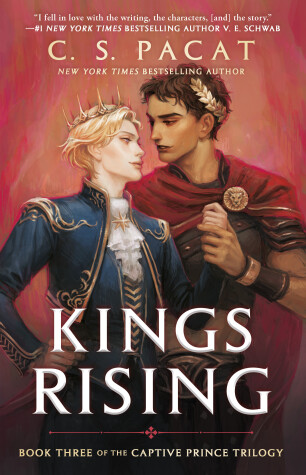“You’ve spent a morning with him and you’re warning me off. Just wait,” said Damen, “until you’ve spent a full day with him.”
“You mean that he improves with time?”
“Not exactly,” said Damen.
I use the word ‘love’ a lot when reading. I love books and their worlds and the people in books with sometimes frightening ease. Which also means I’m tough on the books that don’t make me love them because it should be so easy.
It’s been a long time since people inside a book made me love them this hard.
I don’t know how it happened, except it’s so exactly my kind of story and it hit me at the right time. Still, there’s a good story, and there’s 2:30 am on a Saturday morning, three books in six days, no critical faculties left, wrung out and happy, because I had to get to the last page.
Nikandros passed it to him wordlessly. Nikandros had the slightly stupefied look that Damen remembered from several of his own adventures with Laurent.
I take that back, I do know how it happened. I knew it from the start of book one. It’s not the world-building— although, as aforementioned, I’m very into the clash of these cultures. It’s not the host of characters— although each is great in their own way. It’s not the hero’s journey Damen has to take— although it’s so satisfying. It’s not the slow burn and the foreplay— although also yes.
It’s the demented little cast-iron bitch of a prince, the smart mouth and smarter brain, arrogant and intractable, the one with a deep, true, fierce center, worth ten men, worth a kingdom, once the context is there to understand who he is.
Here, have more descriptions:
Realisation came to Damen. Laurent’s wariness was not, at this moment, the high walls of the defended citadel. It was that of a man with a portion of his guard down, who was desperately unused to it.
---
His expression could not be read, except for, if you knew him, the courage that he sustained though he was alone, and tired, and without friends, and he must know that it was close to the end.
---
And because Laurent’s life had been dragged from its course, because he was not the sweet, bookish youth he might have been, but instead was hard and dangerous as cut glass, Laurent was going to take on Kastor’s best sword work, and force it back.
See my first paragraph; I’ve got a list of favorite characters as long as both arms. Even amongst them, Laurent stands apart. I loved him as soon as he walked on the page, back in book one, cold and cruel and implacable, because I absolutely knew someone that complicated was going to have so much more going on under the surface. Waspish, annoying— all his worst qualities are also his best once those layers peel back, once you dig deeper down.
And that’s what I love, the digging. There are battles and games and more ragtag adventures, but it’s the slow build of friendship, the careful vulnerabilities, that make this book shine. It’s a love story. That was the meat of book two. It’s the heart of book three. But there are no shortcuts to get there. Nothing about it is easy. Pacat doesn’t tell you; she shows. By the time the book reaches the I-would-die-for-you part, it’s all been earned, built, fought, taken, given, and won about a dozen times over instead of fallen into.
For that, I’m a goner in twelve different ways. Three books in six days kind of goner. By the end, I can’t even mourn the sweet, bookish Laurent he was supposed to be. I mean I do, but still— give me the barbed one, the difficult one, the delightful and maddening one. The one worth all the trouble. The cold-hearted young prince who knows himself completely, and the tender-hearted young king who’s got to learn who he’ll be.
And okay, okay, just one more:
Nikandros was looking at Laurent.
“He’s very—”
“You get used to it,” said Damen, with a little wellspring of joy inside him, because that wasn’t really true.
